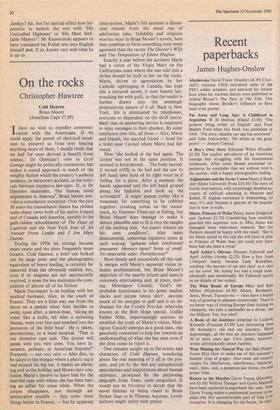On the rocks
Christopher Hawtree
Cold Heaven Brian Moore (Jonathan Cape £7.95) have no wish to expedite communi-
cation with the Americans. If we could apply the power of electrical repul- sion to preserve us from ever hearing anything more of them, I should think that we had for once derived a benefit from science.' Dr Opimian's view in Gryll Grange might be politically contentious but makes a sound approach to much of the weighty fiction which the country's authors produce, to temporary acclaim, in the inter- vals between expensive law-suits. If, as Dr Opimian maintains, 'the human mind degenerates in America', Brian Moore pro- vides a consolatory exception. Over the past 30 years his transatlantic stance has yielded some sharp views both of his native Ireland and of Canada and America, notably in the guilt-ridden schoolmaster of The Feast of Lupercal and the New York lives of An Answer From Limbo and I Am Mary Dunne.
During the 1970s his settings became more exotic and the plots frequently more bizarre. Cold Heaven, a brief tale bulked out by large print and the photographic equivalent of heavy leading, is certainly far removed from the obviously realistic but, even if its enigmas are not satisfactorily resolved, it none the less maintains the com- pulsion of almost all of his fiction.
Marie Davenport is on holiday with her medical husband, Alex, in the south of France. They are a little way out from the shore on a pedalo when Alex decides to swim; soon after, a motor-boat, 'slicing up water like a knife, hit Alex a sickening thump, went over him and smashed into the pontoons of the little boat'. He is taken, unconscious, to a local hospital. 'That is our intensive care unit, The doctor will speak with you very soon. You have in- surance, perhaps, or American Express?' Presently — not very nice — Alex dies, to be taken to the morgue where a plastic tag is tied around his big toe. It makes an alarm- ing end to the holiday and throws into con- fusion Marie's resolve to leave him for the married man with whom she has been hav- ing an affair for some while. When the corpse disappears, not through ad- ministrative muddle — th.ey order these things better in France, — but by apparent resurrection, Marie's life assumes a dimen- sion remote from the usual run of adulterous tales. Infidelity and religious worries recur in Brian Moore's novels; here they combine to form something even more agonised than the recent The Doctor's Wife and The Temptation of Eileen Hughes.
Exactly a year before the accident Marie had a vision of the Virgin Mary on the Californian coast where she was told that a shrine should be built to her on the rocks. Marie, driven to agnosticism by her Catholic upbringing in Canada, has kept this a tortured secret; it now haunts her, wracking her with guilt, so that the reader is further drawn into the seemingly preposterous nature of it all. Back in New York, life is dominated by telephones, everyone so dependent on the shrill instru- ment that an answering service is employed to relay messages in their absence. By some confusion over this, all three — Alex, Marie and Daniel, the married friend — head for a hotel near Carmel where Marie had her vision.
Now 'she looked at the bed again. The corpse was not in the same position. It seemed to have moved... The body moved. It turned stiffly in the bed and she saw its left hand take hold of its right wrist as if feeling for a pulse. After a moment the hands separated and the left hand groped along the bedtable and took up the wristwatch'. It might appear rather like a treatment for something to be cobbled together, creaking noises on the sound- track, by Hammer Films out at Ealing, but Brian Moore does manage to make it almost plausible and to fit it into the tangles of the exciting plot. 'An expert witness on his own condition', Alex takes disinterested, somewhat repulsive notes at each waking: 'aphasia when confronted unawares. Memory lapse? Sense of smell. No detectable odor. Putrefaction?'
How closely and successfully all this real- ly merges with Marie's apparent vision re- mains problematical, but Brian Moore's depiction of the nearby priests and nuns is extremely entertaining and, at times, mov- ing. Monsignor Cassidy, 'God's im- probable functionary in his green madras slacks and purple tennis shirt', devotes much of his energies to golf and is an en- thusiast for the Crosby Pro-Am otherwise known as the Bob Hope special. Unlike Father Niles, importuningly anxious to establish the truth of Marie's vision, Mon- signor Cassidy emerges as a good man, one genuinely concerned to help her towards an understanding of what she has seen even if she does come to reject it.
One remains caught up in the events and characters of Cold Heaven, wondering about the real meaning of it all in the pro- cess, and yet by the end any metaphysical speculations and suppositions about human existence, prompted by the perplexing epigraph from Yeats, seem misguided. It would not be frivolous to decide that the novel finishes by being closer to Bram Stoker than to St Thomas Aquinas. Lesser
authors might enjoy such praise. ,














































 Previous page
Previous page